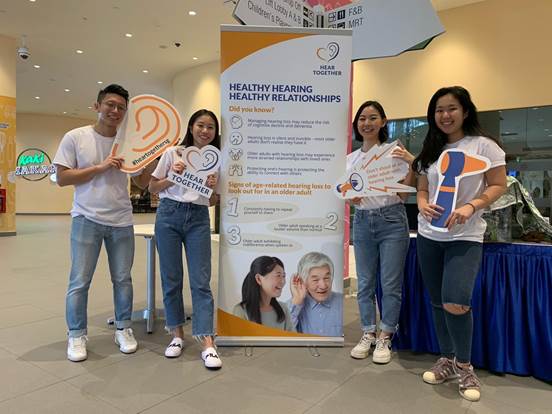Hear together
NTU students are encouraging family and friends to accompany seniors to go for hearing screenings.

The NTU team behind Hear Together (from left to right) – Justin Yeo, 25; Juliana Soh, 23; Gladys Lim, 24; and Faith Koh, 24.
More than half of Singapore’s seniors would be more inclined to participate in a hearing screening when accompanied by a family or friend, according to a survey done by four final-year communications students from Wee Kim Wee School of Communication and Information at Nanyang Technological University (NTU) students. As such, the team launched a campaign called Hear Together.
Their survey, which compiled responses of 223 families with at least one senior in the family, augmented the findings of several past studies – both local and international – that highlighted the prevalence of age-related hearing loss and the problems associated with it. A local study published in the Annals Academy of Medicine in 2017 led by Dr Gary Lee, head of audiology at Ng Teng Fong General Hospital on the prevalence of hearing loss among the seniors in Singapore, had estimated that about two in three Singaporean seniors aged 60 and above suffer from hearing loss. This figure of 422,000 seniors is set to double by 2030.
Despite the rising number of cases expected, there is still many Singaporeans who have low awareness of their hearing status. Shared Dr Lee, “When asked ‘Do you think that you have a hearing loss?’, many of our elderly would answer ‘No’ despite having been found later to have moderate hearing loss or worse.
“Hearing impairment is often seen as secondary in the face of more pressing health issues. Early screening will definitely provide the opportunity for the elderly to recognise and address their hearing problems,” said Dr Lee.
Caregivers can help in this too, by influencing the seniors to seek help for their hearing loss, said Professor William Hal Martin, director M.Sc. Programme (Audiology) at the National University of Singapore, Yong loo Lin School of Medicine. “Caregivers are often the first to recognise that someone is struggling with communication issues. They also have special trust-based relationships with those they care for so they may have a high degree of influence on the health behaviours of those they care for.”
He added: “I have significant hearing loss and it took about 10 years for me to realise that I was missing very important information during conversations. My family recognised it and encouraged me to get a complete hearing test. I found that I had lost much of my high-frequency hearing and could benefit from hearing aids.”
Lai Siu Fai, senior audiology manager at Singapore Association for the Deaf (SADeaf), also emphasised the importance of family and friends in encouraging seniors to go for screening. “Going for a hearing screening alone can be intimidating. Having a companion during the screening can help to give the elderly more confidence in dealing with any diagnosis. They also learn how to manage hearing loss together,” said Lai.
The NTU team’s interviews with the seniors’ family members revealed that the seniors’ hearing loss not only affected the seniors but also their caregivers. This had become a source of stress in the caregivers’ lives and most of them did not know how to manage the stress of caregiving. Age-related hearing loss among seniors can result in depression, social isolation, cognitive decline and dementia. This has prompted the Hear Together team to encourage family and friends of the seniors to learn more about age-related hearing loss, hearing loss myths and how they can manage hearing loss in seniors.
Added Justin Yeo, 25, co-founder of Hear Together: “Unlike well-known conditions such as high blood pressure where the elderly could remember doctors’ advice, most of their knowledge on hearing loss depended on hearsay. This underscored the need for us to put out reliable, accurate information on age-related hearing loss.”
In light of COVID-19, the team at NTU has focused their campaign online such as posting educational videos and on social media. They are also encouraging the public to do a preliminary hearing test using the World Health Organization’s hearWHO mobile app, which currently is only in English and can be downloaded from the Apple store and Google Play at www.who.int/health-topics/hearing-loss/hearwho.
“The key aim is to encourage early detection so that family and friends can work together with the elderly to tackle the impact of hearing loss and improve their quality of life,” said co-founder of Hear Together, Faith Koh, 24.
The team’s efforts will culminate in a Facebook live stream to commemorate World Hearing Day on March 3 where an expert from SADeaf will discuss age-related hearing loss and answer questions from the public. Hear Together is also in partnership with SADeaf to arrange screenings for the public in March, which are now fully booked. Said Justin, “We are hoping to increase the number of screening slots and are in discussion with our partners.” Alternatively, those who want to get screened can go through SADeaf for an appointment where the cost will be S$15 – https://sadeaf.org.sg/contact-us/.

0 Comments